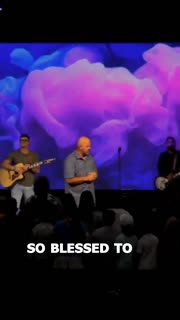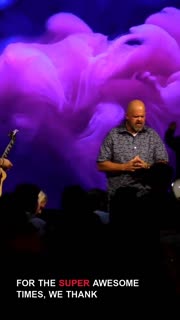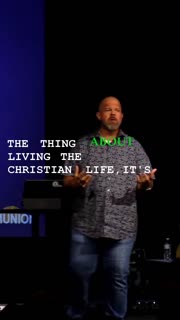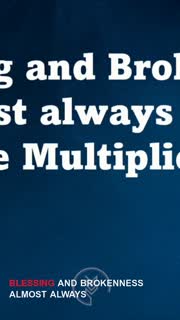Embracing Communion: Blessing, Brokenness, and New Beginnings
Devotional
Sermon Summary
Bible Study Guide
Sermon Clips
### Quotes for Outreach
1. "We are so blessed to have amazing children in this church. Amen? Amen. Amazing young adults. Amazing teachers and coaches and administrators and support staff. Love you all. We are so proud of you. And we want you to have the best year ever." [20:52] (19 seconds)
2. "For the super awesome times, we thank you. For the hard times, we thank you because we know you are going to get us through. And Lord, I pray right now that your hand will be upon each person standing right here in front of this platform right now. God, from the youngest to the oldest, Lord, that you would just have an anointing upon them." [21:20] (17 seconds)
3. "God, I believe that in our midst right now, that there's an amazing future for our church, for our community, for our state, for our country, for this world. There are ministries. There are business leaders. All in the makings right here, God. And I know you have an awesome future for each one of these young people." [22:14] (18 seconds)
4. "If you have missed one Sunday service this summer, raise your hand. Awesome. I'm not going to keep counting up because I don't want to embarrass anybody. Some of y'all, welcome back. We've missed you. It's been a few months. We know who you are and we still love you." [01:08:03] (12 seconds)
5. "We are a congregation willing to be vessels that you can use, willing to be hands and feet extended in this community to help the lost and the hurting and the broken around us, to find the restoration and the strength and the encouragement and the love that only comes from a relationship with Jesus Christ." [01:41:06] (17 seconds)
### Quotes for Members
1. "The thing about living the Christian life, it's not just about what you know, theologically. One critical aspect to growing in Christ is who you know in relationship. And so it's about building relationship around shared interests, common interests, you know, and we've got some coming already planned." [53:03] (16 seconds)
2. "If we're not careful spiritually, we can wind up doing some stuff without knowing why we're doing it and realize we're just going through some kind of ritual that has no spiritual application whatsoever. So we're going to learn a little bit of this journey about why we take communion and what it all stands for." [57:33] (17 seconds)
3. "Blessing and brokenness almost always come before multiplication. Now there's some natural examples of this in Jesus ministry. The most common, the easiest one to go to for the sake of time. And when I tell it is, is when he fed the thousands, right? Two different accounts and different numbers used. But when he filled the thousands, the great throng of people who had come to hear him teach so much so that it pushed him out onto a boat, he could teach them that he's feeding all these people." [01:14:18] (25 seconds)
4. "Some people never reach their potential in ministry and service because they refuse to give God their brokenness. Some people never reach their potential ministry and service because they avoid situations where there's a chance that they could be exposed to brokenness." [01:24:03] (16 seconds)
5. "We can't avoid those situations. We just got to be open and trust God that no matter what happens, he's got your back and he's going to get you through it. Well, pastor Ronnie, it's easy for you to say you're a pastor you have a great wife you have great kids you have a great house a great job a great life it's easy for you to sit there and tell people they need to trust God yeah but please let me tell you angela and i are not exceptions to the blessed and broken process we've been through some stuff." [01:25:19] (33 seconds)
Ask a question about this sermon
1. "We are so blessed to have amazing children in this church. Amen? Amen. Amazing young adults. Amazing teachers and coaches and administrators and support staff. Love you all. We are so proud of you. And we want you to have the best year ever." [20:52] (19 seconds)
2. "For the super awesome times, we thank you. For the hard times, we thank you because we know you are going to get us through. And Lord, I pray right now that your hand will be upon each person standing right here in front of this platform right now. God, from the youngest to the oldest, Lord, that you would just have an anointing upon them." [21:20] (17 seconds)
3. "God, I believe that in our midst right now, that there's an amazing future for our church, for our community, for our state, for our country, for this world. There are ministries. There are business leaders. All in the makings right here, God. And I know you have an awesome future for each one of these young people." [22:14] (18 seconds)
4. "If you have missed one Sunday service this summer, raise your hand. Awesome. I'm not going to keep counting up because I don't want to embarrass anybody. Some of y'all, welcome back. We've missed you. It's been a few months. We know who you are and we still love you." [01:08:03] (12 seconds)
5. "We are a congregation willing to be vessels that you can use, willing to be hands and feet extended in this community to help the lost and the hurting and the broken around us, to find the restoration and the strength and the encouragement and the love that only comes from a relationship with Jesus Christ." [01:41:06] (17 seconds)
### Quotes for Members
1. "The thing about living the Christian life, it's not just about what you know, theologically. One critical aspect to growing in Christ is who you know in relationship. And so it's about building relationship around shared interests, common interests, you know, and we've got some coming already planned." [53:03] (16 seconds)
2. "If we're not careful spiritually, we can wind up doing some stuff without knowing why we're doing it and realize we're just going through some kind of ritual that has no spiritual application whatsoever. So we're going to learn a little bit of this journey about why we take communion and what it all stands for." [57:33] (17 seconds)
3. "Blessing and brokenness almost always come before multiplication. Now there's some natural examples of this in Jesus ministry. The most common, the easiest one to go to for the sake of time. And when I tell it is, is when he fed the thousands, right? Two different accounts and different numbers used. But when he filled the thousands, the great throng of people who had come to hear him teach so much so that it pushed him out onto a boat, he could teach them that he's feeding all these people." [01:14:18] (25 seconds)
4. "Some people never reach their potential in ministry and service because they refuse to give God their brokenness. Some people never reach their potential ministry and service because they avoid situations where there's a chance that they could be exposed to brokenness." [01:24:03] (16 seconds)
5. "We can't avoid those situations. We just got to be open and trust God that no matter what happens, he's got your back and he's going to get you through it. Well, pastor Ronnie, it's easy for you to say you're a pastor you have a great wife you have great kids you have a great house a great job a great life it's easy for you to sit there and tell people they need to trust God yeah but please let me tell you angela and i are not exceptions to the blessed and broken process we've been through some stuff." [01:25:19] (33 seconds)










